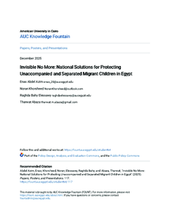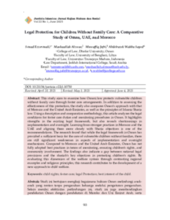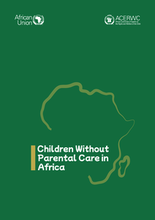Displaying 1 - 10 of 103
This policy paper examines Egypt’s protection framework for unaccompanied and separated migrant children, highlighting both significant recent advances, such as national SOPs, a new asylum law, and expanded residence permits, and persistent challenges related to legal visibility, registration delays, and service access. It proposes actionable reforms to strengthen legal, administrative, and service systems, including expanding family-based alternative care to migrant and refugee children, developing child-friendly asylum procedures, and better integrating NGO, refugee-led, and community-based support into state structures.
On October 23, 2025, the Transforming Children’s Care Collaborative hosted a webinar exploring Kafaalah—a long-standing childcare practice in Muslim communities that has been observed for more than 1,400 years.
This piece examines persistent gaps in Egypt’s Kafala system for children deprived of parental care, highlighting the lack of disaggregated data on children, foster families, and care homes.
This study examines Algeria’s use of kafala as a legally recognized alternative to adoption, highlighting its role in protecting the identity and citizenship rights of children of unknown parentage. While kafala aligns with Islamic principles and offers a protective framework, legal gaps, administrative barriers, and social stigma persist, underscoring the need for reforms to ensure children’s full legal identity and social inclusion.
This study analyzes how Omani law protects vulnerable children without family care through foster arrangements, comparing it with practices in Morocco, the UAE, and the principles of Islamic Sharia law. While Oman’s legal framework provides a foundation for care, the research highlights weaknesses in implementation and oversight, recommending stronger monitoring, greater community involvement, and closer alignment with both regional best practices and Sharia objectives.
In this webinar, the Africa Working Group on Children Without Parental Care now called Family First for Children Without Parental Care, (FAFICA), explores key global debates and initiatives advancing care reform, including updates from the African Union and global events like the Global Ministerial Conference on Ending Violence Against Children.
UNICEF seems a national consultant to conduct a rapid assessment of institutions providing residential care for children in South Sudan.
UNICEF seeks an international consultant to develop comprehensive alternative care guidelines for kinship care, foster care, Guardianship, adoption, and residential care, based on relevant legislation and best practices to ensure the protection and well-being of children in South Sudan.
Italy and Libya signed on December 20 an agreement allowing the evacuation of 1,500 vulnerable migrants from Libya to Italy, over the next 3 years.
The African Committee of Experts on the Rights and Welfare of the Child (ACERWC/the Committee), in collaboration with African Union Member States, partner organizations, children and young people, launches the first of its kind Continental Study on Children Without Parental Care (CWPC) in Africa. The study, conducted from 2020 to 2022, amid the COVID-19 pandemic, covered over 43 countries in the five regions of Africa.




